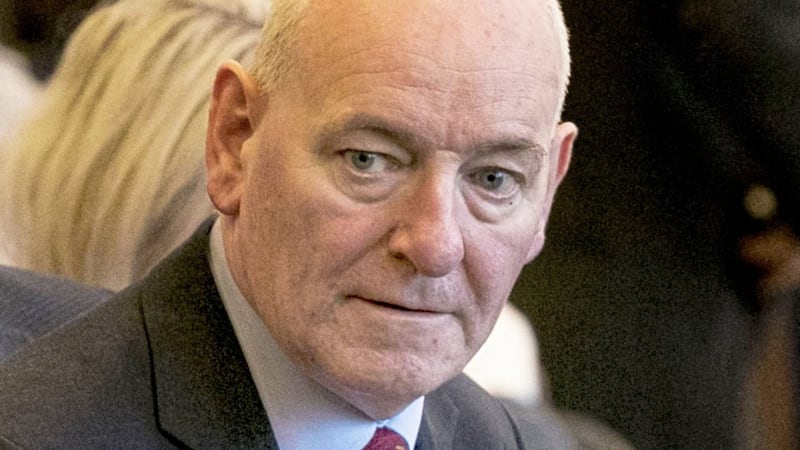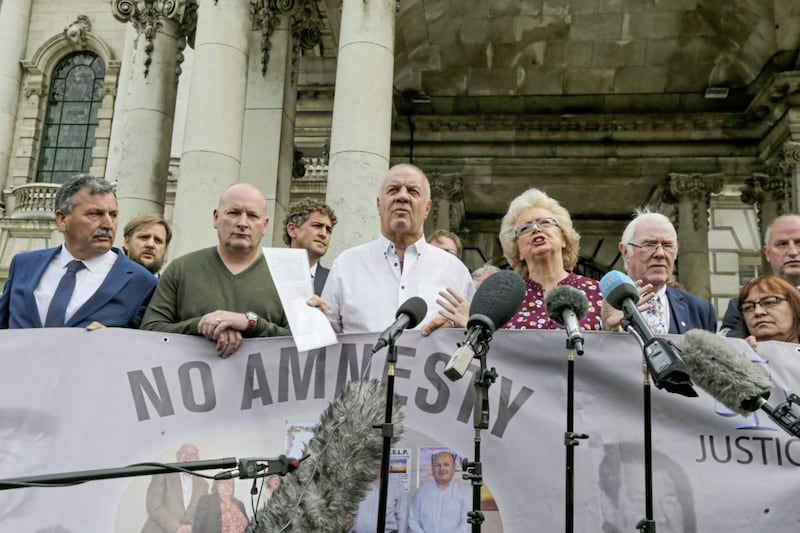THE IRISH government, Sinn Féin and the DUP acquiesced to a British government proposal for a blanket amnesty 16 years ago, according to former SDLP leader Mark Durkan.
The one-time Foyle MP said legislation proposed in 2005 by the then secretary of state Peter Hain would have provided immunity for both paramilitaries and members of the security forces from prosecution for Troubles offences.
Mr Durkan, who led the SDLP from 2001-2010 and was one of his party's chief negotiators during a series of talks processes, said republicans ultimately withdrew support for the Northern Ireland Offences Bill after pressure from victims' groups.
His remarks follow Wednesday's announcement by Secretary of State Brandon Lewis of a planned statute of limitations for offences related to the conflict up to 1998.
Mr Lewis confirmed that the de facto amnesty will "apply equally to all Troubles-related incidents".
Mr Durkan, who in 2019 stood as a Fine Gael candidate in the European Parliament election, said the two governments and Stormont's parties should feel a "collective sense of shame for letting victims down".
"You can understand why different parties at different times we were not up for addressing the past but all those parties can't now pretend that the failure on the past just began with the British government this week," he told The Irish News.
"While I was frustrated for all those years and I'm angry with the current British government for what they're doing, the fact is I also share the shame that the political process should feel for the serial failure on dealing with legacy issues."
However, the former SDLP leader said a similar proposal floated 16 years ago had been on course to become law before Sinn Féin withdrew its backing for the bill.
He said the proposed legislation emerged in the wake the inconclusive Weston Park negotiations in 2001, where there had been efforts to address the issue of 'on the runs'.
"The British government’s Way Forward document in 2003 was the first signal that in the name of addressing the anomaly with on the runs, as they called it, they were looking at something that was possibly going to dispense with all offences committed during the Troubles," he said.
"They moved on the logic of that paper and produced the Northern Ireland Offences Bill in 2005."
The proposed legislation would have enabled those not yet convicted of offences to be given a certificate that made them exempt from arrest. Certificate holders could still be prosecuted but only before a so-called special tribunal and would be subsequently released on licence, similar to the Good Friday Agreement's early release scheme.
At the time, newly-elected Sinn Féin MP Conor Murphy travelled to Westminster to welcome the legislation, while Mr Hain – now Lord Hain – said it would give victims “closure”.
In 2005, Mr Durkan characterised it as "an alliance of sleaze" between republicans and the British.
Speaking yesterday, he said he had dubbed the proposed legislation the “Hain-Adams bill”.
"Sinn Féin were supporting the bill though they were denying it was an amnesty," he said.
“Meanwhile, the DUP were going through nominal opposition to the bill but at no point did they say it was a deal breaker in the manner that how the first and deputy first minister were appointed and a review of the north-south bodies were deal breakers.
"Peter Robinson was pretty open at the time that the tone of DUP opposition was to ensure blame for it hung around David Trimble’s neck."
The former SDLP leader said the Irish government, at the time led by Bertie Ahern, did not oppose the bill.
"We in the SDLP we’re on our own in opposing that bill – the Irish government at no time endorsed our argument," he said.
Mr Durkan said pressure from victims' groups led Sinn Féin to withdraw its support days before Christmas 2005.
"Sinn Féin's denial and spin was not sustainable,” he said.
"The DUP will say they opposed it but if you look at the terms on which they opposed it, they didn't go outright and oppose it."
Reports from the time, show the then Sinn Féin vice-president Pat Doherty said the legislation was "far removed" from what had been agreed during the talks four years previously at Weston Park.
He accused the British government of "sleight of hand", saying the law would grant amnesty to members of the security forces who committed murder during the Troubles.
Mr Hain told MPs that Sinn Féin's decision to reverse its original position and oppose the bill was because security forces personnel would also have qualified for the scheme.








